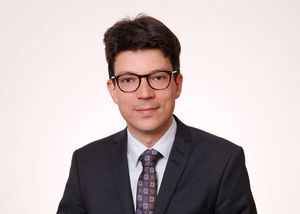Interview with Director Professor Dr. Johannes Henn

Why is your research important? What is the connection between your work and experimental particle physics?
My research takes place at the interface between theoretical and experimental physics. Theoretical physicists investigate mathematical models for elementary particles and their interactions. A successful theory has to be in line with all existing experimental insights and can be tested by carrying out new experiments. It's fascinating that theorists can sometimes predict new particles in order to be able to put forward a theory that is mathematically coherent. Examples include the top quark and the Higgs boson – they both existed 'on paper' long before they were actually detected.
If a model is consistent in itself and is broadly accepted, it is tested in experiments. The results are then fed back into further theoretical considerations. In my specific case, this involves investigating particle collisions – in other words what happens when elementary particles collide with each other in an accelerator such as the LHC, which particles are created and how they respond after the collision.
You haven't just made a name for yourself as a researcher, you've also been very involved in teaching – as co-author of the textbook "Scattering Amplitudes in Gauge Theories", for example. What can doctoral students at the IMPRS EPP expect of you?
I love talking about physics to undergraduates and doctoral students, and I regularly give lectures at international doctoral schools. Doctoral students at the IMPRS will benefit from the enormous expertise of our research group.
I'm also planning to invite international researchers to take sabbaticals with the research group, so that young scientists will have the opportunity to engage with them: this might take the form of informal working group seminars, or journal clubs where current publications are discussed. This kind of culture of debate is vital to promote the scientific development of doctoral students.
You will be a Director at the MPI for Physics from October 2018, but you will be at the Institute on a part-time basis right away. Why?
I regard my part-time phase at the Institute as a useful preparation period. It gives me the opportunity to get to know the new Institute and its administration step-by-step and establish contact with my future colleagues. Numerous new recruitments are planned for the autumn, with scientists joining us from Argentina, India, Russia and the USA. It's important to me that our new colleagues feel at home in Munich right away and be able to continue with their research directly. Effective administrative support is important for foreign researchers in particular here – they need help applying for visas, looking for accommodation and finding out about German courses offered at the Institute, for example.
You spent several years conducting research at the IAS in Princeton: what did you find particularly fascinating about this institution?
The Institute for Advanced Study had a major impact on both my scientific and personal development. It was a privilege for me to be able to converse with the world's top experts in my research field on a day-to-day basis and establish lots of new contacts.
The Institute was founded at a time when many researchers were in need of a secure retreat, especially those from Europe. The most famous example is probably Albert Einstein, who spent 22 years there. I think this has imbued it with a distinctive scientific spirit – making it a place capable of producing new and perhaps speculative ideas. All in all, the sense of openness to new ideas is an aspect of science in the U.S. that has had a lasting impact on me.
What are you looking forward to in Munich?
There's so much! I'm looking forward to having the Alps on my doorstep again, for instance. You'll no doubt find me up the odd mountain at weekends.